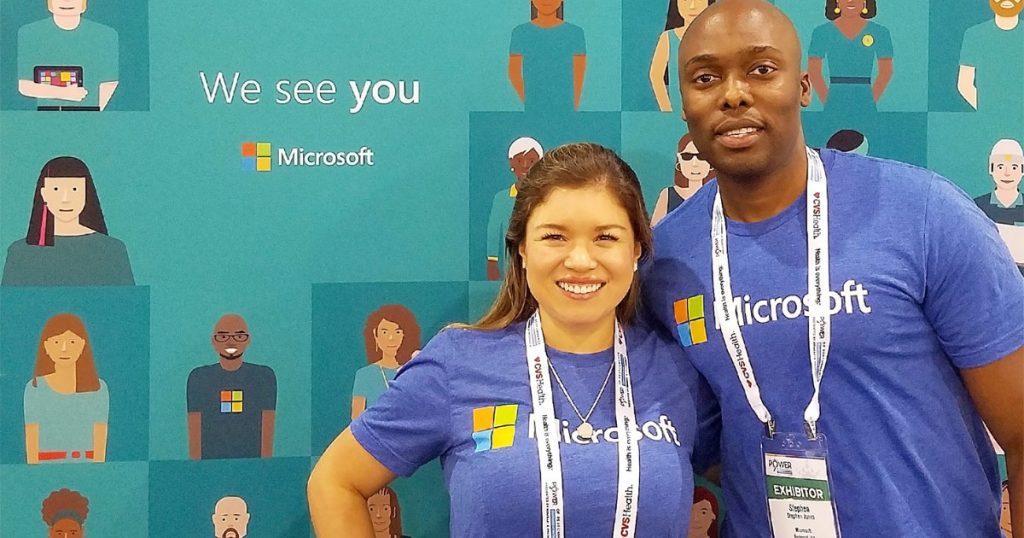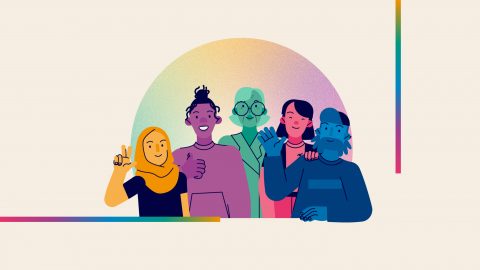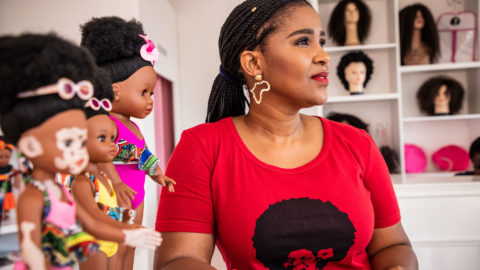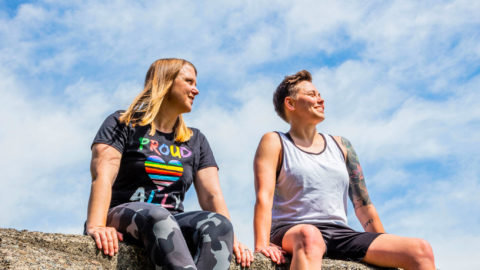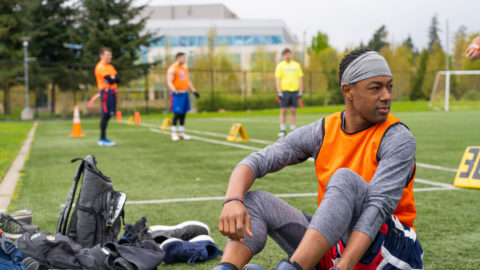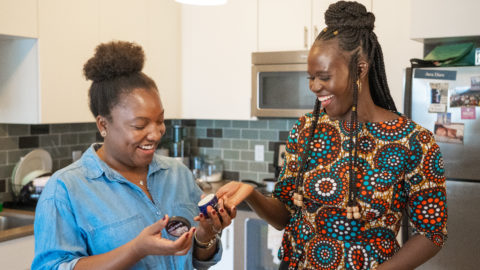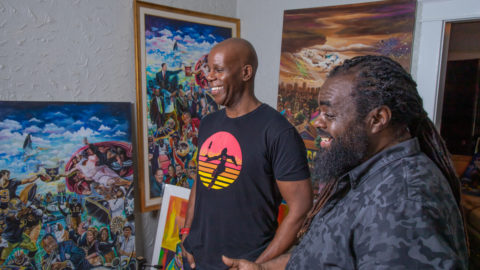Flip the script: how to interview a company
At recruiting events, take control of your job search by putting your prospective company in the hot seat
For me, and many others, career fairs can feel intimidating.
I recall the first time that I attended a career fair. I was seeking an internship, which I was told was vital if I wanted a job offer after graduation. No pressure, right?
Naturally shy and filled with anxiety, I nervously made the rounds from booth to booth. I was a novice to the idea of walking up to a stranger and initiating a meaningful, career-minded convo beyond meekly asking, “Um, excuse me, may I grab this pen?”
Here’s the deal. No one is going to say, “Wait a minute. You look smart. Take this free pen and this job! Welcome aboard!” It just doesn’t happen that way.
The good news is that you can dry off those profusely sweaty palms and take control.
Since my first awkward career fair experience, I’ve learned it’s equally important to get to know the company as it is for them to get to know you. It’s worth it to push that nervousness aside, because asking “so where is Microsoft headquartered?” won’t convey all the awesomeness that you bring to the table.
This is your time to meet the company of your dreams, while still making a great first impression. Yes, it’s all about getting that coveted job offer, but let’s be sure you earn one with the right company.
I tapped into my own “had I known then what I know now” lessons plus picked the brains of a couple of Microsoft employees to make sure you have the best tips at hand. Sarah Eytinge has been recruiting at Microsoft for two years. Deen King-Smith is a senior product marketing manager who has been on both sides of recruitment—as a student and as a Microsoft representative. Both agree that job seekers must remember that recruitment and career conferences are all about the candidates.
Be ready to ask the right questions
Sarah says she often hears questions that are easily answered on the company’s website. Research is key here.
Before you go to a recruiting event, make a list of companies you plan to speak with. Then, study the companies’ histories, products and services, recent news, financial statements, and executives. Take note of their corporate values, and think about if they map to your own personal beliefs and passions.
Go a step further: find out if they are “walking the walk” and follow their social channels. Have absolutely no shame in your game! Check out LinkedIn posts and blogs by employees to see if they are happy and doing what they set out to do. The internet is your friend. Trust me, you’ll have a ton of great questions if you do the digging. Side note: it helps you fake the confidence level, too!
Asking “where are you headquartered?” is a no go. However, saying, “I see that the company is located across 123 countries. Could you tell me to how Microsoft helps its employees work together and feel more closely connected?” If working in a collaborative, global environment is important to you, this question helps you find out if the company is a fit and gives the interviewer a sneak peek into what matters to you.
Don’t be afraid to ask what the company means to the recruiter. “I love when they ask why I enjoy working at Microsoft,” Sarah added. For her, it shows a genuine interest when you chat with the employees about their experiences and delve further in the conversation.
Prepare for a two-way conversation
Be ready to deeply discuss your background, experiences, and learnings. This is key to better understanding if the company will value what you bring to the table.
In talking about your expertise, be clear with the recruiter about what you have done, and what you haven’t. “Be sure to know your resume like the back of your hand,” advises Deen. For example, he has a background in engineering even though he currently works in product marketing. He once interviewed a candidate who couldn’t expand further on a technical project he had worked on. Deen’s technical experience allowed him to see that the candidate was exaggerating when the student assumed that his expertise was limited to marketing.
This bluff didn’t bode well for the student. However, had the student spoken to what he genuinely knew, he and Deen could have had a more meaningful conversation, and the student could have come to better understand if Microsoft was truly a fit. We can chalk that up to a “we’ll never know” moment.
Differentiate yourself
Imagine a world where you’re in a room filled with job candidates who have similar experience to you. Surprise! Welcome to your new challenge: to stand out. Your job is to be able to explain what differentiates you from the pack. Having a strong handle on your passion and values will help you shine.
“What are you doing outside of class?” Deen asks of candidates who are still students. “If everyone has a computer science degree or an MBA, what makes you special?” He advises candidates to create a narrative to accurately tell that story.
Deen was once impressed by a student who had a dual major in mechanical engineering and physics. The student wanted to be an architect, but his school did not have an architectural program. The candidate passionately spoke of how his school’s scheduling system wasn’t the best, so he developed a cross-platform, course-scheduling app and server backend that was adopted by students across campus. By hearing this candidate speak passionately about his side project, Deen realized the non-computer science student had the drive to teach himself coding; the intuition to recognize a need; and the skillset to identify the overall costs, development, and shipping of the app. “It was a thoughtful conversation. Ultimately, this guy’s side hustle was a great part of his story. To hear him explain the end-to-end process of a project he took on for ‘kicks and giggles’ revealed his value,” he added. “It showed what made him special.”
The candidate got the job, by the way.
Being specific can also open doors you might not have known were even there. For example, say someone who’s looking for an internship is interested in the technology industry, yet she has no clue what role she’d like to take on. Giving a recruiter a detailed breakdown of her experience and her passions could prompt the recruiter to recommend a program such as the Explore Microsoft program, an internship that exposes students to various software engineering roles within the company. By revealing what makes you different, you’ll learn how each company differentiates itself from the hundreds of companies at the career fair.
Get the scoop
Career events, especially at conferences, can feel a bit overwhelming. But use the moments standing in line, taking a breather, or grabbing snacks to network with other attendees. “Sure, they feel like the competition, but use that time to network with other attendees. Find out which companies they spoke with at different booths, what they enjoyed about their company interactions, and more,” Sarah advises. “It helps you to be better prepared.”
Be ready to answer the question
Here’s the deal. You’ve prepared, researched, and practiced for this big day. You’ve taken notes on every company you met to know whether they have what it takes for your career plans. However, you’ll most certainly be asked, “why do you want to work with us?”
Do you know what you want to say? Sure, you do! You did your research, right? And you paired your company findings with your passions and values. You’ve got this!
“When I ask ‘why Microsoft?’ I want to know what it is about Microsoft that gets you excited,” says Sarah. “The response should be compelling, meaningful, and told in an authentic way.”
Sure, this event is all about you and discovering the company of your dreams. Yet, the big question can’t be avoided. In fact, it could be the perfect way to set yourself apart and be memorable. Be ready!
Relax and have fun
Conferences can make the most confident people squeamish when they feel like their future is on the line. Just know that nervousness comes with the territory. That woman at the front of the line who seems unfazed? She’s feeling the heat, too. Perhaps she hides it better than most, but she’s feeling it! Being prepared will provide a sense of calm and help you “fake the funk” too.
As a side note, recruiters are also nervous. They’re spending their day talking to strangers, too. They don’t want to miss identifying the next great employee for their company because the conversation didn’t take the right direction.
Above all else, have a great time—even though you’re surrounded by nerves, business casual wear, and free stuff . . . yes, it’s possible.
”Have fun and be excited about what excites you,” Deen reminds candidates. “We’re here to see you and learn who you are. Use it to your advantage, and show us what you’re bringing to the table and what makes you you.”
Plus, don’t forget the free pen.

